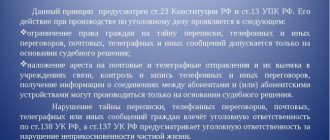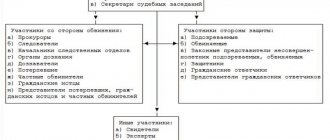What constitutional right does privacy of correspondence apply to and what does it consist of?
In Art.
23 of the Constitution of the Russian Federation, the right to privacy of correspondence and various messages (postal, telegraph and others) is proclaimed together with such related rights as the privacy of telephone conversations. These rights are an important aspect of the institution of privacy, as well as part of a person's personal status. The constitutional right to privacy of correspondence provides a variety of ways to transmit confidential information regardless of the medium, for example:
- paper letters, correspondence;
- SMS messages;
- letters sent via the Internet to email;
- messages sent via various instant messengers (Whatsup, Viber);
- messages on social networks.
The secrecy of correspondence carried out through communication institutions (mail, telegraph) and individual exchange of messages in any form are equally guaranteed by the Constitution of the Russian Federation.
IMPORTANT! Secrets include not only the content of transmitted letters and messages, but also information about the recipient, the number of messages transmitted, the time they were sent (the so-called information about connections, determination of the Constitutional Court of October 2, 2003 No. 345-O).
In this case, the subject of this right is any private person who exchanges messages and takes actions to maintain and protect the confidentiality of transmitted information. The following are required to maintain the secrecy of correspondence:
- any private persons to whom messages are not addressed;
- the state represented by its representatives - government bodies and officials.
Law enforcement officers want to gain access to citizens' correspondence without a court decision
The Ministry of Telecom and Mass Communications, together with the Ministry of Internal Affairs, the FSB and the Ministry of Economic Development, have prepared a bill that stipulates that owners or other owners of technological communication networks that have an autonomous system number are required to ensure the storage on the territory of the Russian Federation of information about the facts of reception, transmission, delivery and (or) processing of voice information, text messages, images, sounds, videos or other communications from users for three years from the end of such actions. At the request of the authorities carrying out operational intelligence or ensuring the security of Russia, such information must be transferred to fulfill the tasks assigned to these authorities.
It is also provided that owners or other owners of communication networks will have to suspend the provision of services to users on the basis of a reasoned decision of one of the heads of the body carrying out operational investigation or ensuring the security of Russia, and resume on the basis of a court decision or a reasoned decision of the one who made the decision on the suspension.
In a commentary to “AG”, Elena Avakyan, a member of the Council of the FPA of the Russian Federation, indicated that the provisions of the bill grossly violate the norms of Part 2 of Art. 23 of the Constitution in terms of ensuring the right to privacy of correspondence. She noted that, based on the interpretation of this constitutional norm given by various courts, including the ECHR (Decision of the Constitutional Court of October 2, 2003 No. 345-O, ECHR Ruling in the case “Roman Zakharov v. Russia”, decision of the Supreme Court dated 25 September 2000 No. GKPI00-1064), the information covered by the concept of “secrecy of correspondence” includes not only information about the contents of the letter, but also official information about the senders of the letter and the addressees of its recipient.
According to Elena Avakyan, the regulatory model provided for by the bill not only contradicts the Constitution in terms of the possibility of providing access to information about all messages to “authorized state bodies carrying out operational investigative activities or ensuring the security of the Russian Federation” without a corresponding court decision, but also encroaches on the right itself a citizen to freedom in its broad interpretation, since it provides the possibility of uncontrolled and arbitrary shutdown of communication services for any person at the direction of certain “heads of an agency carrying out operational investigative activities or ensuring the security of the Russian Federation.”
“Thus, judicial control over interference in the private life of citizens is actually eliminated and the burden of going to court is shifted to the citizen, who is actually asked to run after “law enforcement officers” in attempts to appeal their actions to suspend communication services, which in modern conditions, when the lion’s share all vital needs of citizens are realized through mobile phones and online services, when most financial transactions are carried out through online banking applications, when legally significant correspondence with government bodies is carried out through the public services portal, this actually means a complete blocking of a person’s life, that is, a restriction of his freedom in the new digital reality. I believe that even if it is possible to cause more damage to the digital transformation of society and the popularization of digital technologies among the population than the adoption of this bill in the proposed wording, it is very difficult,” summarized Elena Avakyan.
Aleksey Bukanev, partner at ZKS AB, considered that the amendments to the law are a consistent state policy regarding the possibility of controlling the transfer of data by various types of communications. He noted that the changes will really help operational officers in solving crimes and bringing the perpetrators to justice. “With the development of data transmission technologies to detect crimes, new opportunities for recording crimes are also required. With legal and proper enforcement, this will truly help law enforcement officials in protecting the rights and interests of citizens and the state. However, in modern Russia, this norm will be used more often for total control over citizens, their negotiations and the exchange of information in any form,” the expert believes.
In his opinion, the adoption of the bill will also significantly slow down the development of telecommunication networks, in particular 5G, since the financial burden on network owners to purchase the necessary equipment for storing a huge amount of information will increase many times over. “The state makes the work of operatives easier, but significantly complicates, and maybe even “ruins” the development of networks. In addition, part of the financial burden will be placed on ordinary citizens due to an increase in the cost of tariffs,” said Alexey Bukanev.
He also drew attention to the illegal and contrary to the Constitution provision that the suspension of the provision of communication services to users can be based on a reasoned decision of one of the heads of the body carrying out operational investigative activities or ensuring the security of the Russian Federation.
Lawyer of the Moscow Region Administrative Office Olga Karlova emphasized that the proposed changes make the provisions of Part 2 of Art. 23 of the Constitution, according to which everyone has the right to privacy of correspondence, telephone conversations, postal, telegraph and other messages. Restriction of this right is permitted only on the basis of a court decision. In addition, the amendments completely destroy the fundamental human right to privacy, personal and family secrets.
“This is precisely that fragile moment and that fine line, having crossed which, the state turns a person’s private life into the personal property of authorized state bodies carrying out operational investigative activities or ensuring the security of the Russian Federation (or rather, specific officials from these bodies). After all, as can be seen from the proposed changes, these bodies, the list of which is also open, do not even need a court decision. In my opinion, this is simply monstrous,” said Olga Karlova.
The lawyer noted that access to such information can be had secretly, and the information obtained can be used at your own discretion. Also, according to the provisions of the bill, justification before the court for the need to request information about a specific person in respect of whom there is reasonable suspicion of his involvement in criminal activity is not required.
Olga Karlova drew attention to the fact that the court is also excluded from situations of suspension of provision to users,” the lawyer indicated.
In her opinion, it is necessary to fight crime in all its manifestations, including through the ability of law enforcement agencies to access information transmitted in various ways, but first of all and, of course, it is important to ensure guarantees of complete safety of information from possible “leakage,” and also the possibility of access to this information by law enforcement agencies only in agreement with the supervisory authority - the prosecutor's office and only after receiving court permission for such access, which must be motivated and justified.
Legislative guarantees of the right to privacy of personal correspondence
The main guarantee of the right to privacy of correspondence in the Constitution lies in the provision of paragraph 2 of Art. 23 that any restrictions are possible only on the basis of a court decision. This norm has been continued in a number of federal laws:
- Art. 182 of the Civil Procedure Code of the Russian Federation establishes the right of the court and participants in the process to voice and examine correspondence materials in an open meeting only with the consent of the participants in the correspondence. Otherwise, the meeting must be closed.
- Art. 13 of the Criminal Procedure Code of the Russian Federation establishes guarantees in the field of criminal proceedings: seizure of postal items, their seizure, including information about the connections of a specific person, are permitted only if there is a court decision.
- Art. 63 of the Law “On Communications” dated 07.07.2003 No. 126-FZ duplicates the provision of the Constitution on the secrecy of personal correspondence in relation to messages transmitted via electric and postal communication networks, and also establishes the obligation of telecom operators not to disclose confidential information that has become known to them and to ensure observance of secrecy by other persons (paragraphs 1, 2 of the above-mentioned article). For inspection and opening of mail and attachments, a court decision is required (clause 3 of Article 63).
- Paragraph 2 tbsp. 8 of the Law “On Operational Investigative Activities” dated August 12, 1995 No. 144-FZ states that operational investigative activities related to infringement of the secrecy of correspondence and communications are possible only on the basis of a court decision.
Key aspects of privacy
The main features of the right to integrity are the spiritual side and individuality. Each person has his own definition of what belongs to his private life. But, according to the laws, the object of protection of law can be a person’s dignity, thoughts and feelings, his inner world, honor, opinion, etc.
Thus, private life is understood, as a rule, to be the physical and spiritual sphere, which is controlled by the citizen himself. If a person does not want any information to be disseminated about him - for example, about his hobbies, religious beliefs, illnesses, then no one can make them public. This is required by law.
The right to privacy includes the following rights:
- Right to protection of personal data. All transferred data must be stored and protected from transfer to third parties.
- The right to privacy of personal and family life. It lies in the fact that a person has the right to independently build relationships. No one has the right to disclose information about personal and family life to other persons, even family members.
- The right to personal property and non-property relations.
- The right to protection of honor and good name.
- The right to non-disclosure of medical and medical confidentiality.
- The right to protection of religious beliefs, secret of confession, etc.
- The right to privacy of adoption (Article 139 of the RF IC, Article 155 of the RF Criminal Code).
- Right to protection of communications. A citizen can count on protection from attacks on all means of communication (telephone, telegraph, e-mail, Internet). Moreover, he may demand the physical integrity of communications, both electronic and written.
The rights listed above are constitutional. Their safety is ensured by the Constitution and the state.
In the process of life, a person can transmit information about himself and his life to other people. This can be with his voluntary consent, legally. For example, when contacting a lawyer, he talks about his legal aspects of life. The lawyer, in turn, must comply with the requirements of the law and cannot disclose the information received. The same applies to other officials and specialists who receive any information about a citizen (notary, doctor, nurse, lawyer, teacher, educator, etc.).
Particular attention should be paid to the qualification of the crime. As a rule, the act is based on the citizen’s personal, selfish interest in causing harm by disseminating information to others.
If there is no personal, selfish interest at the time of disclosure, then the action is not considered a crime.
Responsibility for violation of confidentiality of correspondence
Violation of the right to privacy of correspondence, telephone conversations, postal, telegraph and other messages constitutes a crime under Part 1 of Art. 138 of the Criminal Code of the Russian Federation (hereinafter referred to as the Criminal Code of the Russian Federation), and entails an alternative punishment in the form of:
- fine up to 80,000 rubles. or in the amount of 6 months’ income of the convicted person;
- compulsory work up to 360 hours;
- correctional labor for up to 1 year.
Part 2 art. 138 of the Criminal Code of the Russian Federation provides for a qualified offense (committing the same actions using one’s official position) and provides for punishment in the form of:
- fine from 100 thousand to 300 thousand rubles. or in the amount of 1- or 2-year income;
- deprivation of the right to hold certain positions or engage in certain activities;
- compulsory work up to 480 hours;
- forced labor for up to 4 years;
- arrest up to 4 months;
- imprisonment for up to 4 years.
The formulation of this crime contains an open list of means of communication, interference with which would constitute a violation of the secrecy of personal correspondence. The elements of a crime are any actions committed against the will of a person and aimed at disclosing information contained in correspondence.
NOTE! The storage by the telecom operator of information about the subscriber, the messages sent to him, and their content does not constitute a violation of the secrecy of correspondence, provided that this information is not disclosed to third parties (see decision of the Tagansky District Court of Moscow dated April 2, 2014 No. 2-826/2014).
About this question
What is privacy?
There is no single definition of this concept. The most common interpretations of the term “private life” define it as the inner world of a person or aspects of his being that he wants to make closed to other people.
In the legal aspect, the concept of private life includes:
- Correspondence.
- Personal space.
- Family life.
- Data on work and family composition.
Certain areas of law, for example civil law, additionally include honor, good name, and reputation of a person in private life.
In what other cases may the right to privacy of correspondence be limited?
Information constituting the confidentiality of correspondence may also be requested by the court during civil proceedings. In this case, it is not necessary for the court to issue a special decision justifying the need to request this information (see Resolution of the Arbitration Court of the Central District dated November 28, 2017 No. A14-14947/2016).
An example of legalized interference in personal correspondence can also be the actions of postal institutions to destroy unclaimed correspondence after a long storage period, if it is impossible to deliver it to the addressee or return it to the sender (due to his absence, refusal, etc.). These actions can also be carried out solely on the basis of a court decision (see, for example, decision of the Pyatigorsk City Court of the Stavropol Territory dated December 29, 2017 No. 2-4490/2017).
The concept of inviolability of private and personal life of a citizen and Russian legislation
In the Russian Federation, the right to privacy is strictly regulated.
- Article 23 of the Constitution states that every citizen has the right to privacy, personal and family secrets, and protection of his honor and good name.
- Article 24 of the Constitution states that the collection, storage, use and dissemination of information about the private life of a person without his consent is not allowed. State authorities and local government bodies, their officials are obliged to provide every citizen with the opportunity to become familiar with documents and materials that directly affect his rights and freedoms, unless otherwise provided by law.
- In Article 12 of the Universal Declaration of Human Rights and Art. 17 of the International Covenant on Civil and Political Rights also defines the right to integrity.
The right to privacy is a natural human right. This right belongs to a person from birth, and it cannot be alienated in any way.
The right to privacy presupposes a ban on interference in a person’s personal and family life by other persons or the state. The government guarantees protection from any kind of interference.
We have listed the main legal acts that are in force in Russia.
Let us note that international laws have been adopted and are in force that also protect the private, personal lives of citizens.
Protection of personal space by law
In the Russian legal system, personal space is protected by the norms of administrative, civil and criminal codes. The application of specific rules of law depends on the severity of the actions committed. The following punishments may be imposed:
Have a question for a lawyer? Ask now, call and get a free consultation from leading lawyers in your city. We will answer your questions quickly and try to help with your specific case.
Telephone in Moscow and the Moscow region: +7
Phone in St. Petersburg and Leningrad region: +7
Free hotline throughout Russia: 8 (800) 301-39-20
- Fine.
- Compensation for damage caused.
- Forced labor.
- Correctional work.
- Deprivation of liberty.
Civil law provides additional ways to protect personal space. The victim may demand to eliminate the violation and refute the defamatory information publicly, including on the pages of the media.
The principle of inviolability
The essence of this principle is the prohibition on the collection and distribution of certain data about a citizen without his consent.
However, the legislation contains a number of exceptions. They concern situations related to violation of the law by the citizen himself. In this case, his personal data may be transferred to law enforcement agencies. But the procedure for collecting and using data is determined by a court decision in accordance with the legislation of the Russian Federation.
Who can restrict this right?
Legislation strictly regulates the procedure for limiting the basic rights of citizens. This can be done only under certain conditions and only by court decision.
However, there are contradictions in some aspects of the law. Thus, a number of lawyers note the inconsistency between the norms of the Constitution of the Russian Federation and the Law “On State of Emergency,” which states that the right to privacy is not subject to limitation. Legal scholars note that in some situations such an interpretation does not correspond to the realities of society.







